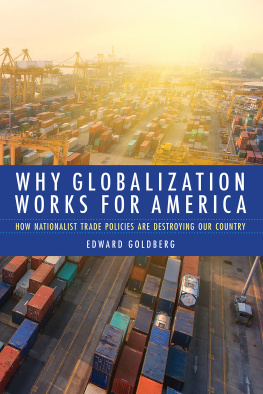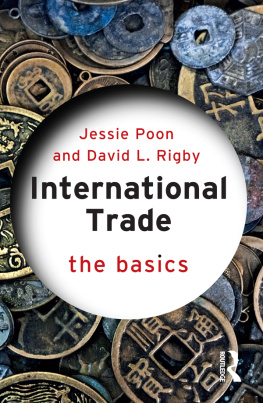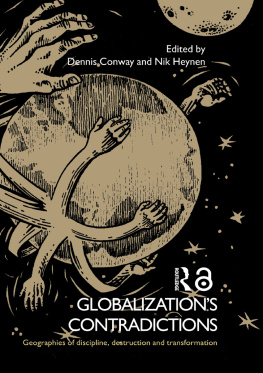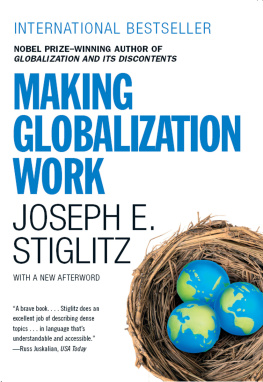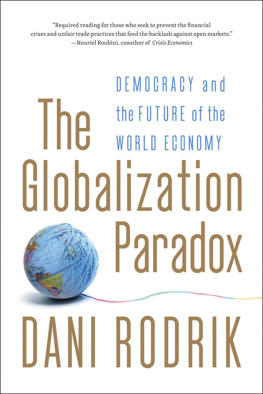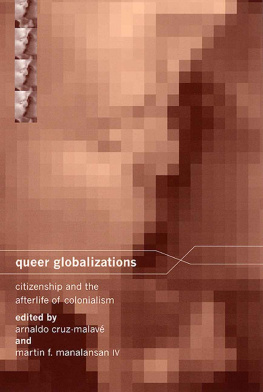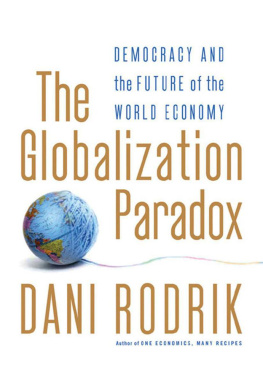Contents
Guide
Page List
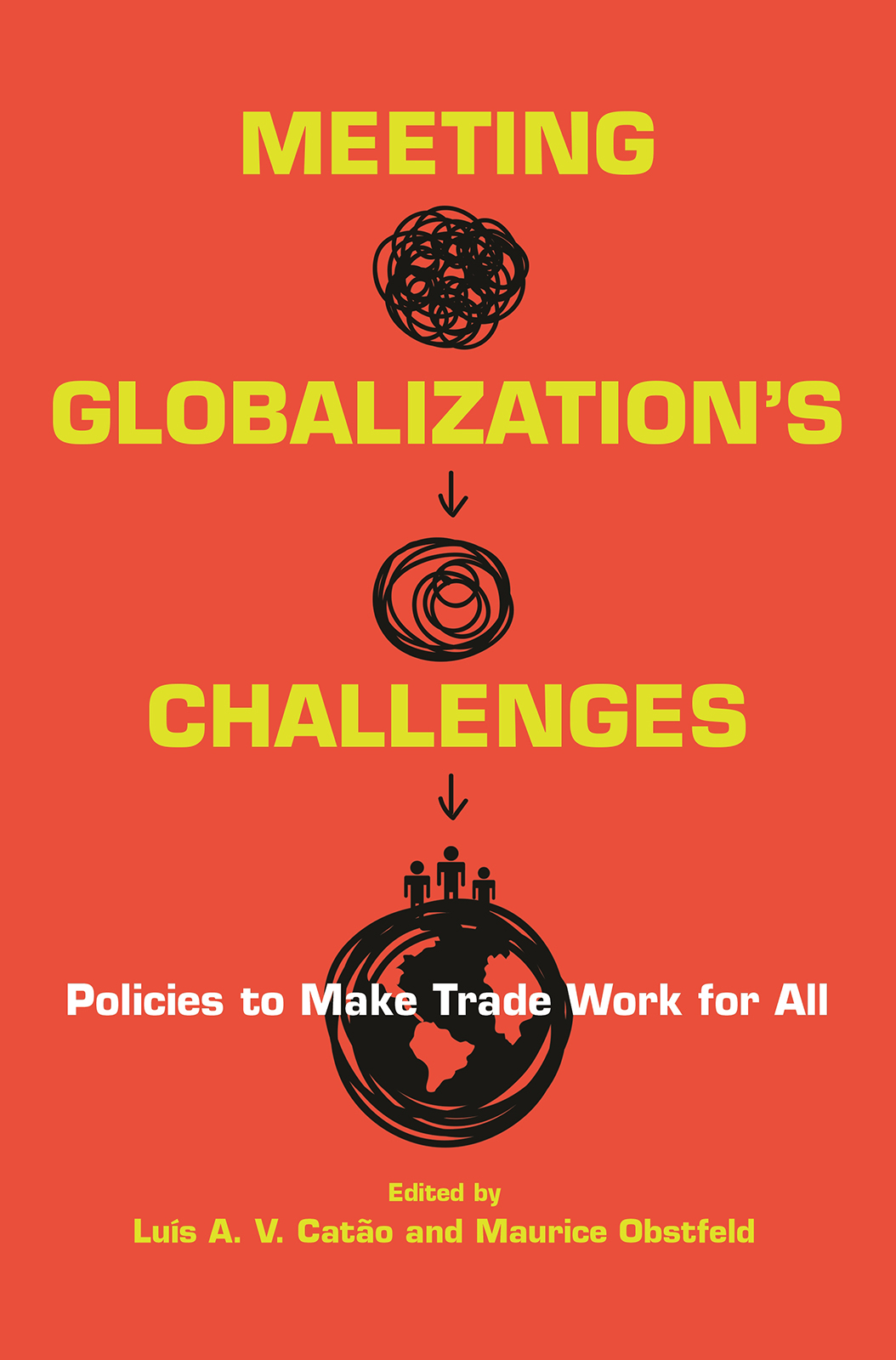
MEETING
GLOBALIZATIONS
CHALLENGES
_____________________________________
MEETING
GLOBALIZATIONS
CHALLENGES

Policies to Make Trade Work for All
_____________________________________
LUS A. V. CATO AND
MAURICE OBSTFELD, EDITORS
with a foreword by Christine Lagarde
PRINCETON UNIVERSITY PRESS
PRINCETON AND OXFORD
Copyright 2019 by International Monetary Fund and Princeton University Press
Published by Princeton University Press
41 William Street, Princeton, New Jersey 08540
6 Oxford Street, Woodstock, Oxfordshire OX20 1TR
press.princeton.edu
All Rights Reserved
ISBN 978-0-691-18893-5
ISBN (ebook) 978-0-691-19886-6
Version 1.0
British Library Cataloging-in-Publication Data is available
Editorial: Joe Jackson and Jacqueline Delaney
Production Editorial: Brigitte Pelner
Text and Cover Design: C. Alvarez-Gaffin
Jacket Art: Shutterstock
Production: Erin Suydam
Publicity: Tayler Lord
Nothing contained in this book should be reported as
representing the views of the IMF, its Executive Board, member
governments, or any other entity mentioned herein. The views
expressed in this book belong solely to the authors.
For Elza and Jennifer
Contents
_____________________________________
xi
xiii
xv
1
Lus A. V. Cato and Maurice Obstfeld
PART I
TRADE AND THE GAINS FROM GLOBALIZATION
43
Andrs Rodrguez-Clare
52
Ufuk Akcigit
PART II
GLOBALIZATION, DEVELOPMENT, AND INEQUALITY
69
Dani Rodrik
77
Keyu Jin
94
Franois Bourguignon
PART III
GLOBALIZATION, DEINDUSTRIALIZATION, AND LABOR MARKET ADJUSTMENT
113
Paul Krugman
121
Gordon H. Hanson
129
Nina Pavcnik
143
Rafael Dix-Carneiro
PART IV
ADJUSTMENT POLICIES
157
Anne Krueger
166
Lori G. Kletzer
PART V
THE POLITICAL ECONOMY OF TRADE BACKLASH
181
Jeffry Frieden
197
Edward Alden
208
Michael Trebilcock
PART VI
CHALLENGES AHEAD
221
Angus Deaton
229
Laura D. Tyson
237
Martin Wolf
261
Ernesto Zedillo
275
Acknowledgments
_____________________________________
This book collects and expands the various contributions to a conference on Meeting Globalizations Challenges that took place at the headquarters of the International Monetary Fund (IMF) in Washington, DC, on October 11, 2017. We take this opportunity to thank all conference participants and, in particular, the staff involved in the organization of that event. That group includes Felicia Belostecinic, Lucia Buono, Tracey Lookadoo, Begoa Nuez, and Olga Stankova as well as staff from the IMF audiovisual team. We also thank Florian Gimbel, Jeffrey Hayden, Linda Griffin Kean, and Patricia Loo from the IMF communications department, Mahnaz Hemmati and Evgenia Pugacheva from the IMF research department, and James A. John and Alfred Krammer from the office of the IMFs managing director for extensive support in the various phases of this project.
Several academic colleagues helped us track down some of the historical data on globalization trends that this books introduction uses. We are especially grateful to Laurence Chandy, Michael Clemens, Giovanni Federico, Antonio Tena Junguito, Jonathan Moses, Brina Seidel, Alan Taylor, and Jeff Williamson.
Last but not least, we would like to thank Joe Jackson at Princeton University Press for his consistent encouragement and support of this project as well as Brigitte Pelner, Jacqueline Delaney, and Stephanie Rojas for editorial and marketing work on the book.
Naturally, the usual disclaimers apply. In particular, the views expressed in this books chapters are those of the respective authors, and not necessarily those of the IMF, its executive board, or its management.
Contributors
_____________________________________
Ufuk Akcigit, University of Chicago
Edward Alden, Council on Foreign Relations
Franois Bourguignon, Paris School of Economics
Lus A. V. Cato, University of Lisbon
Angus Deaton, Princeton University
Rafael Dix-Carneiro, Duke University
Jeffry Frieden, Harvard University
Gordon H. Hanson, University of California, San Diego
Keyu Jin, London School of Economics
Lori G. Kletzer, University of California, Santa Cruz
Anne Krueger, Johns Hopkins University
Paul Krugman, City University of New York
Maurice Obstfeld, University of California, Berkeley
Nina Pavcnik, Dartmouth College
Andrs Rodrguez-Clare, University of California, Berkeley
Dani Rodrik, Harvard University
Michael Trebilcock, University of Toronto
Laura D. Tyson, University of California, Berkeley
Martin Wolf, Financial Times
Ernesto Zedillo, Yale University
Foreword
_____________________________________
The increasing interconnection between the worlds economies has led to something that is truly remarkable: more progress for more people than at any time in human history. This is, in many ways, the story of globalization.
At the heart of this story lies the spirit of openness to trade and technological innovation, which in turn have underpinned the cross-border flow of products, capital, talent, and ideas.
These interconnections have transformed our world, especially over the past generation. They helped reduce by half the proportion of the global population living in extreme poverty. They have boosted per capita incomes and living standards across a broad set of countries, and created millions of new jobs with higher wages.
In addition to being more prosperous, human lives are longer and healthier. Back in 1900, the average life expectancy around the world was thirty-one years. It is now seventy-two years, and this reflects in part our ability to harness the power of trade and innovation.
Communities around the world have felt these gains. According to international opinion surveys, most citizens in both advanced and developing economies perceive global trade as good for themselves and their countries.
But that is not the whole story. While the overall gains to society are large and growing, trade and technological change have come with negative side effects: from job losses in shrinking sectors to social challenges in some communities.
Indeed, many countries are experiencing high economic inequality, and some are facing increased political polarization. These problems are not new, nor are they solely due to trade, but trade openness can bring them into sharper relief. The current trade disputes are, in fact, a symptom of these underlying challenges.


